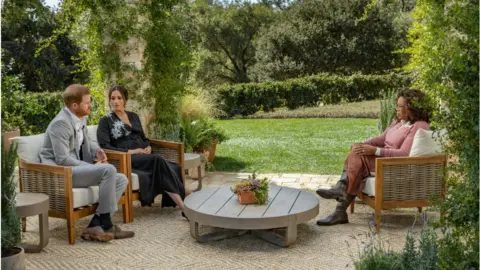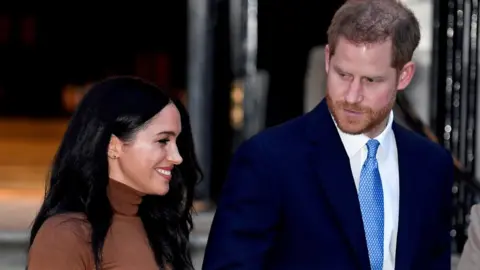Analysis: Harry and Meghan rattle monarchy's gilded cage
 CBS
CBSTraditionally the Palace protects the family by drawing a curtain between the public, formal stuff and the personal stuff; its refusal to comment on the personal is a strategic interpretation of the family's maxim - "never explain, never complain".
The public/personal divide has always been an artifice. Royals get married in front of tens of millions of people, have state funerals, release photos on birthdays and anniversaries, exchange insights into their lives in return for easy-going and generous coverage.
But the divide, however often disregarded, remains the guiding principle of the family's formal relationship with the outside world. Now the contradictions that spring from the mix of personal and public are playing out.
Some key allegations are about the personal behaviour and comments of members of the Royal Family and how, through collective neglect and perhaps some malicious intent, they left Harry and Meghan no choice but to leave.
Other statements painted a terrible portrait of unfeeling staff and courtiers. The entire institution was portrayed as if nothing had been learnt from the days of Diana - Prince Harry and Prince William's late mother.
The duchess is a formidable communicator and has proved herself a very bad woman to pick a fight with. A newly-liberated Harry spoke with almost-eloquence.
'A knife to the heart'
Meghan dealt some of the heaviest blows. What is the Palace to say about the accusation that an unnamed member of the family made a comment - more than one by the sounds of things - about the skin colour of the couple's child-to-be? The mind boggles.
But alongside the personal pain and anger rippling through the duchess's testimony, there came from Harry condemnation of the institution - the suggestion that it was incapable of change, incapable of love, incapable of understanding.
The contradictions of the Palace, and of the monarchy, are exactly that which makes it so special, so strange, so interesting and so difficult to work within - the merging of personal and public roles, the accretion of tradition, the mix of public accountability, ceaseless media interest and the need to remain relevant.
Harry's suggestion that his family too - his father Prince Charles, his brother Prince William - are "trapped" in their world, and that he felt "compassion" for them, was a velvet-covered knife into the heart of the modern monarchy.
Royal life is conducted from within a gilded cage; the players are not meant to rattle the bars from the outside.
 Reuters
ReutersThese are the contradictions Harry walked away (or, in his words, stepped back) from. He was uncomfortable with them before he was married. And when he saw his wife suffering as a result of his being "trapped" in royal life, he found a way out with her.
There are also the contradictions that lie behind many of the decisions that they both spoke out about and are clearly very unhappy about.
It is public money that pays for security. It is tradition that dictates who gets what title. There is no HR department for working royals because it is a family affair. What you do in front of the cameras matters because it reflects on the institution as a whole.
This meshing of personal and public is unique. It is what being a modern royal is all about. And inside it is often a hugely uncomfortable place to be. Harry knew that. Presumably he warned Meghan. But that warning wasn't enough.
Harry and Meghan's experience suggests that the contradictions are too great. Maybe their interview will act as a catalyst for change. But the Crown has been around for a very long time, and change does not come easily to a body in which the past plays such an outsize role.
